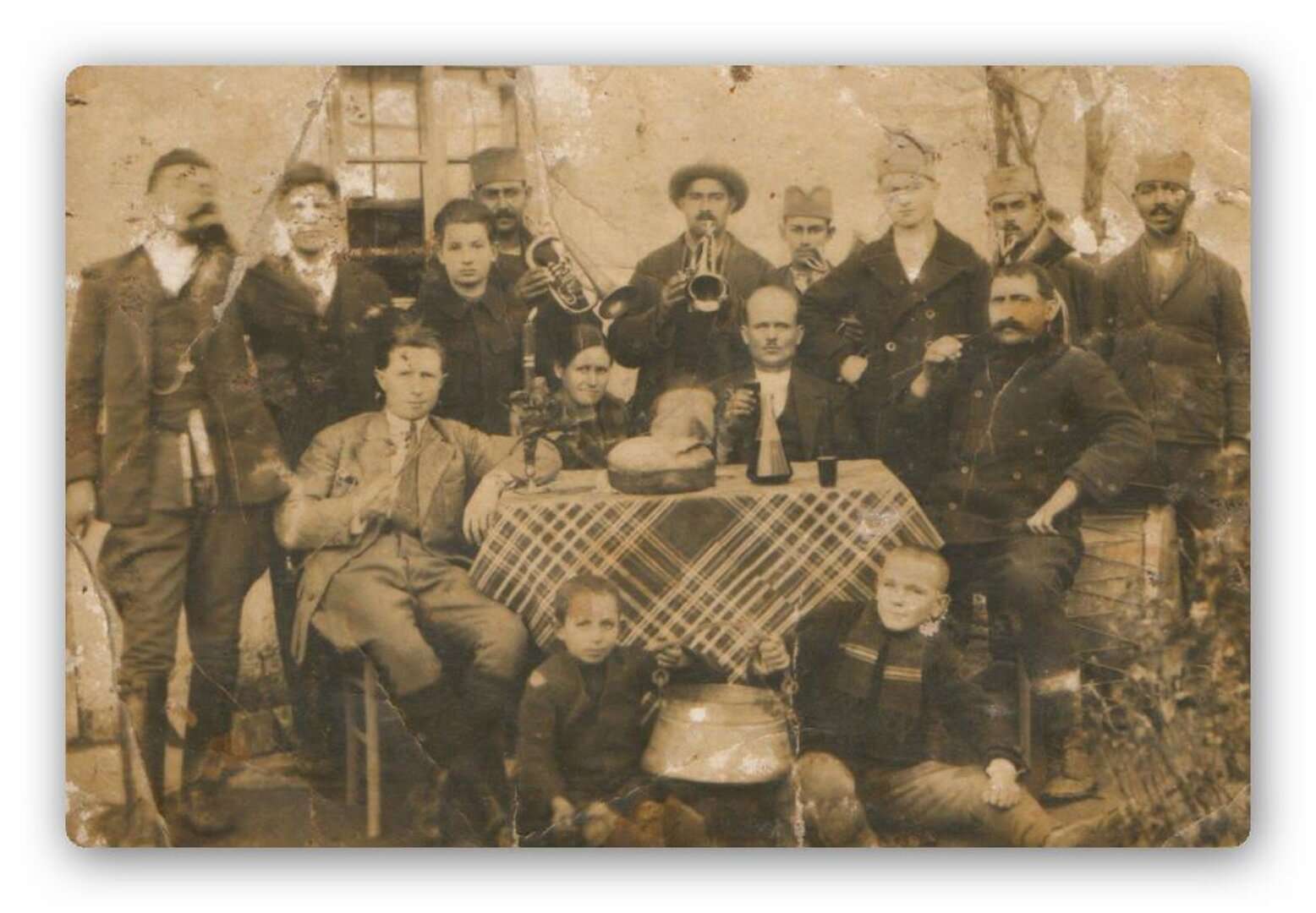Andro juhovichodno Serbija hine but romane lavutara andro žanros perdal o phurdle grupi. Profesijonalno bašavibnaskero dikhaviben hin nekbareder moresis, sar o Roma zaroden bare love perdal o dživipen, bo e marginalizacija buter jekhetaňiben obmedzinďas lengeri forma kije aver buťa. Phurdle lavutara hin but zamukhle andro regijonalno socijokulturno struktura.
Romane phurdle grupi andre juhovichodno Serbija – predikhľipen
Kheratune Serbi the o Roma peske našťi prectavinen bare fameľijakere mulatišaga – bijav- bije phurdlo bašaviben, bo o bašaviben hin zorales thodo le ritualenca (sar hin o kheľiben la dakero le terneha), so buchľaren fameľijakero jekhetaňiben the keren komunitno identita perdal jekhetane kulturne praktika – bašaviben the kheľiben.

The legendary Bakija Bakić and ensemble perform for a Romani wedding. Vranje, Serbia, mid-1980s
Rights held by: Neviza Ćerimović | Licensed by: Neviza Ćerimović | Licensed under: CC-BY-NC-ND 4.0 International | Provided by: Neviza & Miroslav Ćerimović – Private Archive
Nenad Mladenović and band perform Svekrvino Kolo, a slow and emotional ritual dance in 7/8 (3+2+2) performed by the groom’s mother at the beginning of a Romani wedding. The musicians stretch the meter or slightly slow the tempo to increase the intensity. Vranje, Serbia, July 2011

Dejan Avdić and orchestra perform Svekrvino Kolo in the style typical of Vranjska Banja at a Romani wedding. Vranjska Banja, Serbia, July 2010

Dejan Avdić and orchestra play a 9/8 (2+2+2+3) čoček to accompany a wedding procession as celebrants dance down the street. Vranjska Banja, Serbia, April 2010

Jovica Ajdarević and orchestra perform Svekrvino Kolo at a Serbian wedding. Musicians play the same melody for Serbs as they do for Roma, but at a faster tempo and with less elaborate improvisation. Preševo, Serbia, August 2011

Jovica Ajdarević and orchestra perform the popular tune Svadba, svadba [Wedding, wedding!] to entertain the groom at a Serbian wedding. This genre of ‘newly composed folk music’ is based on folk music elements primarily from central Serbia. The fast duple meter is lively, and the lyrics playfully comment on weddings. Preševo, Serbia, August 2011

Jovica Ajdarević and band accompany the ritual ‘dancing of gifts’ for important guests at a Serbian wedding with a suite of songs in 7/8. The song, Zapevala sojka ptica [The nightingale started to sing] is from Kosovo and refers to an unwilling bride’s gifts. Preševo, Serbia, August 2011
O Roma možno peršo razos chudle te bašavel pro phurdle inštrumentala maškar o slugadžipen andro balkansko maribena (1912-1913). Andro tipicko subora hin klarinetos, saksofonos, rotačno ventilovo trupki, baritonovo rohi, tuba, cikňi bubna the bari dujto bubna. Lokalno phurdľi estetika zalel mikrotonalita, melismaticko improvizacija gazel / mekam, ritmicko sinkopacija the asimetricko ritmi sar 7/8, 9/8 the 12/8. O bašaviben the kheľiben Čoček kerel baro kotor le kheratuno repertoaris, nekbuteder paš o Roma, bares andro učo sinkopovano 9/8 (Vranjski čoček) the 2/4 abo 4/4 metra (Romano čoček).

Romani brass band performing at the patron-saint celebration (slava) of the Crevarci family. Vranje, Serbia, 1920s
Licensed by: Nebojša Stojanović | Licensed under: Rights of Use | Provided by: Nebojša Stojanović – Private Archive
Romani brass musicians entertain a group of Serb townsmen at an outdoor excursion for May Day. Vranje, Serbia, 1 May 1938
Licensed by: Novica Jovanović | Licensed under: Rights of Use | Provided by: Novica Jovanović – Private ArchiveTiš hine o džanibne lačhe bašavibnaskere inovatora. O lavutara furt keren hita pal o lumakere popularne bašavibnaskere the filmoskere sthoďipena the keren neve khelibnaskere bašavibena, prekeren len kavka, hoj te aven esteticko “the groove” sar kamen o kheratune Roma the o Serbi.
O džanibne pes furt zathoven la mangaha le nacijonalna the maškarthemutne dženen pal o “Balkansko romano phurdlo bašaviben”. Le romane lavutarenge hin maškarthemutnes thoďi bari paťiv. Sako berš pro nacijakero festivalos pal o phurdle grupi Guča andre Serbija, furt chuden nekbareder ceni. Avrikhelde grupi keren bare alba, so džan pal e luma, sikhaven pes andre televizija the andro filmos the varekana keren maškarthemutne koncerta the turne. Kaja ekzibicija sikhavel bašaviben the kheľibnaskero bašaviben, bašavibnaskere averipena maškar o romane the serbicika repertoara the inovativno bašavibnaskere praktiki thode pro kheratune the maškarthemutne šunde.
Nenad Mladenović and his orchestra perform a čoček during the final competition event at Serbia’s national brass festival. Guča, Serbia, August 2009
Rights held by: Nenad & Stefan Mladenović (performance) — Alexander Marković (recording) | Licensed by: Nenad & Stefan Mladenović (performance) — Alexander Marković (recording) | Licensed under: CC-BY-NC-ND 4.0 International | Provided by: Alexander Marković – Private Archive


